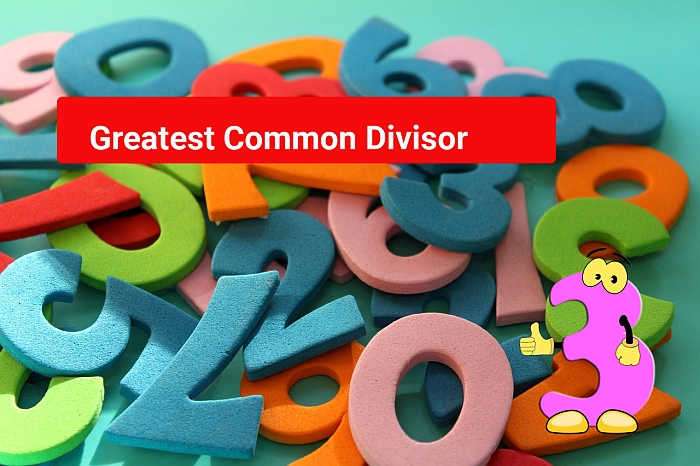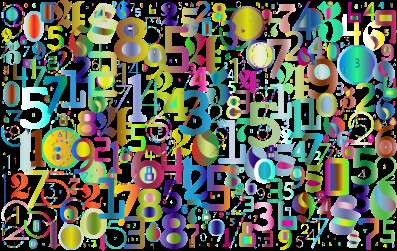Greatest Common Factor Calculator
Instructions: Use this calculator to compute the greatest common factor for a list of integers you provide, showing all the steps. Please type in the integer numbers in the spreadsheet below.
More about the Greatest Common Factor
Use this calculator to find the greatest common factor (GCF) for a list of provided integer numbers. Notice that the GCF cannot be computed unless you provide integer values.
Once you provide a valid list of integers, you will be able to click on "Calculate", which will provide you with steps of the process and the final result.
What is the Greatest Common Factor for a list of integers?
The Greatest Common Factor (GCF), also known as the Highest Common Factor (HCF) or Greatest Common Divisor (GCD), is the largest positive integer that divides each of the integers, without leaving a remainder.
For example, the greatest common factor of 12 and 18 is 6 because 6 is the largest number that divides both 12 and 18.

How to Use this GCF Calculator?
Using our GCF calculator is pretty simple. You need to:
- Enter the numbers you want to find the GCF for into the provided spreadsheet.
- Click on "Calculate".
- The calculator will show the GCF along with the steps in the calculation process.
Methods to Find the GCF
There are different ways of doing the calculation, and one of them based on using prime decomposition . Indeed, the prime factorization method involves breaking down each number into its prime factors:
- Step 1: You need to list the prime factors of each number.
- Step 2: The, you need to identify the common prime factors.
- Step 3: Finally, you will multiply these common factors to get the GCF.
For example, the GCF of 32 and 48 si 16, and this is because:
- Prime factors of 32: \(2 \times 2 \times 2 \times 2 \times 2 = 2^5\)
- Prime factors of 48: \(2 \times 2 \times 2 \times 2 \times 3 = 2^4 \times 3\)
- Common factors: \(2^4 = 16\)
- So then: \(GCF = 2^4 = 16\)
Euclidean Algorithm
The Euclidean algorithm is a more efficient (because it does not involve prime decomposition which could be extremely computationally intensive) method for finding the GCF:
- Divide the larger number by the smaller number.
- Replace the larger number with the smaller number and the smaller number with the remainder from the division.
- Repeat until the remainder is zero; the last non-zero remainder is the GCF.
Here's how you would find the GCF of 32 and 48 using this method:
- 48 ÷ 32 = 1 remainder 16
- 32 ÷ 16 = 2 remainder 0
- There, it is concluded that the GCF is 16.

Examples of Finding GCF
What is the GCF of 32 and 48?
As calculated above using Euclid's algorithm, the GCF of 32 and 48 is 16.
What is the GCF of 9 and 36?
Using prime factorization:
- Prime factors of 9: \(3 \times 3\)
- Prime factors of 36: \(2 \times 2 \times 3 \times 3\)
- Common factors: \(3 \times 3 = 9\)
What is the GCF of 10a and 20a?
When dealing with variables:
- Prime factors of 10a: \(2 \times 5 \times a\)
- Prime factors of 20a: \(2 \times 2 \times 5 \times a\)
- Common factors: \(2 \times 5 \times a = 10a\)
Technically, we don't know if \(a\) is prime or not, but it is irrelevant since both terms 10a and 20a have it as a factor.
GCF Calculator with Steps
Our GCF calculator not only provides the result but also shows the steps involved:
- It lists the prime factors of each number.
- It identifies the common factors.
- It calculates the product of these common factors to give the GCF.
How Do I Find the GCF of Polynomials?
Finding the GCF of polynomials involves:
- Identifying the common terms or factors in each polynomial.
- Factoring out these common terms to find the GCF.
For example, for the polynomials \(3x^2 + 6x\) and \(9x + 18\):
- Common factors: \(3x\)
- GCF: \(3x\)
Why Use a GCF Calculator?
Using a GCF calculator can:
- Save time and reduce errors in manual calculations.
- Provide a step-by-step breakdown of the process, which is educational.
- Handle large numbers or complex polynomials with ease.

Common Questions About the Greatest Common Factor
What is the greatest common factor of 12 and 18?
Answer : The GCF of 12 and 18 is 6.
What is the greatest common factor of 24 and 36?
Answer : It is found that the GCF of 24 and 36 is 12.
What is the greatest common factor of 20 and 12?
Answer : The GCF of 20 and 12 is 4.
What is the greatest common factor of 8 and 12?
Answer : We find that the GCF of 8 and 12 is 4.
What is the greatest common factor of 16 and 8?
Answer : We get that the GCF of 16 and 8 is 8.
More Integer and Factorization Tools
When working with the Greatest Common Factor , you might find it useful to delve deeper into the operations involving divisions. For instance, if you're looking to understand the fundamental aspects of divisibility, our Greatest Common Divisor Calculator can be an invaluable tool.
It's particularly handy when you need to find the largest number that divides two or more integers without leaving a remainder .
Moreover, if your exploration leads you into factoring polynomials or more complex expressions, our Factor Calculator and Factoring Calculator are here to assist. These tools can help you break down numbers or expressions into their prime factors or solve for the roots of polynomials, respectively, providing a comprehensive approach to factorization.






